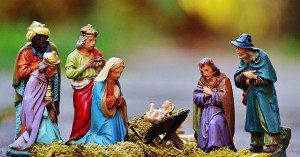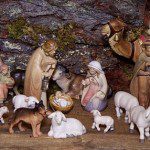Isaiah 61:1-3 Proclaiming God’s Favor This Christmas
One major effect of the commercialization of Christmas is that every year the gap between Christmas and Thanksgiving seems to grow smaller. It is common now to hear Christmas carols in early December; by this time many people have not only bought but have also decorated their trees; Christmas parties abound in offices and places of business. Virtually the only place where one does not see Christmas cribs and hear Christmas carols is in church (a fact that must cause some confusion in the minds of young children). While secular society is frantically anticipating the feast and adapting it for its own purposes, the church obstinately says, “not yet.”1
We are not yet at Christmas. It’s Christmas Eve. We wait for Christmas to arrive. Many of us will spend time celebrating Christmas with family and friends. Just like us, people were waiting for the coming of a Messiah. We see this in the book of Isaiah. While we know today that the Messiah is Jesus Christ, who was born of a virgin in Bethlehem. We have received God’s favor. Yet, there are still others around us who are still looking for God’s favor. Isaiah 61:1-3 proclaims God’s favor this Christmas.
Isaiah is a miniature version of the Bible. There are sixty-six chapters, just as there are sixty-six books in the Bible. The first thirty-nine speak of God’s judgment (like the Old Testament), the last 27 speaks of God’s love (like the New Testament).
Isaiah 61:1-3 is about proclaiming God’s favor. The verses speak about a Person (the Messiah) who has been anointed by God. You can even notice that the verse begins with the Trinity: “the Spirit”, “the Lord God”, and “Me.” This confirms that the Person of which this chapter speaks is Jesus. The verses describe the scope of Jesus’ mission.
THE SCOPE OF JESUS’ MISSION
First, there is the WHO of His mission (Isaiah 61:1-2):
“The Spirit of the Lord God is on Me, because the Lord has anointed Me to bring good news to the poor. He has sent Me to heal the brokenhearted, to proclaim liberty to the captives and freedom to the prisoners; to proclaim the year of the Lord’s favor, and the day of our God’s vengeance; to comfort all who mourn,” (Isaiah 61:1–2, HCSB)
The broken-hearted
The poor
The captives
The prisoners
These are the people for whom Jesus was sent. He was sent to everyone who is hurting during this Christmas season.
Then, there is the WHAT of His mission. This is to “set people free” (Isaiah 61:1).
“The Spirit of the Lord God is on Me, because the Lord has anointed Me to bring good news to the poor. He has sent Me to heal the brokenhearted, to proclaim liberty to the captives and freedom to the prisoners;” (Isaiah 61:1, HCSB)
That is what the Good News does. It heals, it liberates, it frees, it comforts, it provides, it gives beauty, it shares resplendence, it plans righteousness to glorify God.
He came to redeem common, ordinary people like us. The appearance to the shepherds is the perfect compliment to His being born in a stable and laid in a manger. It symbolized His poverty. He left the ivory palaces of heaven to enter a world of woe. He who had been rich became poor that we through His poverty might become rich. It is helpful to balance this point by remembering Matthew’s account in which the star appeared to the wise men, who were the exact opposite of shepherds. They were cultured, respected, wealthy, Gentiles. Jesus came for all.2
Then, there is the WHY of His mission. God has sent Jesus to finish what God planned for His people.
“The Spirit of the Lord God is on Me, because the Lord has anointed Me to bring good news to the poor. He has sent Me to heal the brokenhearted, to proclaim liberty to the captives and freedom to the prisoners;” (Isaiah 61:1, HCSB)
In Leviticus 25, we see that God provided a temporary plan to provide for His people. It was called the Sabbath, which was a way for people to give honor to Him. It culminates in the “Jubilee Year.” This is when debts were forgiven, families were restored, and freedom was granted, temporarily. The Jubilee Year would happen once every fifty years. The reason was so that each successive generation could experience freedom. Otherwise, there could be the potential for economic slavery of one tribe over another. There could be the potential for the rich to rule the poor, the 1% to control the 99%. Instead, God wanted people to fall under His leadership, and not the leadership of an economic dictator. That’s why it is called a day of God’s vengeance.
“to proclaim the year of the Lord’s favor, and the day of our God’s vengeance; to comfort all who mourn,” (Isaiah 61:2, HCSB)
This brings us to the WHEN.
Jesus brought the good news at His first coming. He proclaimed the Year of Jubilee, or the year of the Lord’s favor at that time. When He returns a second time, He will bring about the day of God’s vengeance (Isaiah 61:2).
“to proclaim the year of the Lord’s favor, and the day of our God’s vengeance; to comfort all who mourn,” (Isaiah 61:2, HCSB)
People will pay for not accepting the Good News.
The HOW is simple.
Jesus brings the Good News. We only have to accept it. Then we share this good news with others.3
“The Spirit of the Lord God is on Me, because the Lord has anointed Me to bring good news to the poor. He has sent Me to heal the brokenhearted, to proclaim liberty to the captives and freedom to the prisoners;” (Isaiah 61:1, HCSB)
As Isaiah 61:3 describes, we are the soil, and God plants the righteousness into our hearts.
“to provide for those who mourn in Zion; to give them a crown of beauty instead of ashes, festive oil instead of mourning, and splendid clothes instead of despair. And they will be called righteous trees, planted by the Lord to glorify Him.” (Isaiah 61:3, HCSB)
As God plants the righteousness in our hearts, we share this good news with others. God does wonders. That’s ultimately what Christmas is about.
From the tiny acorn to the might oak tree – one of nature’s great contrasts.
Like the faith the size of a mustard seed, which grows to a large bush.
When God begins, he seems to start out small. But before you know it, big things happen.
Our faith is like that too. It begins with a few words, and a little water. And this small thing we call baptism has the power to save a soul for eternity! God starts small, and ends big! Not too unlike the humble babe in a manger, who as a man dies in shame on a Roman cross, and by doing so pays for the sins of the world. God takes the small, the humble, the lowly, and he works wonders.
And of course, as always, God does the doing. Just as he sends the messenger with the good news, just as he takes the spirit of despair and clothes us with a garment of praise, so too the righteousness He brings to us and for us, He plants it, He waters it, He makes it grow. We just proclaim God’s favor to others. As we do, we simply receive the blessings.4
Isaiah’s poetic prophecy makes it clear – the good news of Jesus brings rejoicing where there was despair. Let us proclaim God’s favor this Christmas!
1 Richard Viladesau, Homilies for the Sundays of Advent and Lent, vol. 4, The Word in and out of Season (New York; Mahwah, NJ: Paulist Press, 1996), 53.
2 Robert J. Morgan, Nelson’s Annual Preacher’s Sourcebook, 2006 Edition. (Nashville, TN: Thomas Nelson Publishers, 2006), 359.
3 Jim Erwin, “Proclaiming God’s Favor,” Isaiah 61:1-3, Advent 2016, Logos Bible Software Notes, 23 June 2016, Internet, http://www.patheos.com/blogs/jimerwin/2016/06/23/proclaiming-gods-favor/, accessed on 23 December 2016.
4 Tom Chryst, “Good News,” Isaiah 61:1-3, 10-11, Advent 3, sermon, 11 December 2005, Internet, http://preachrblog.blogspot.com/2005/12/sermon-isaiah-611-310-11-advent-3.html, accessed on 23 December 2016.














